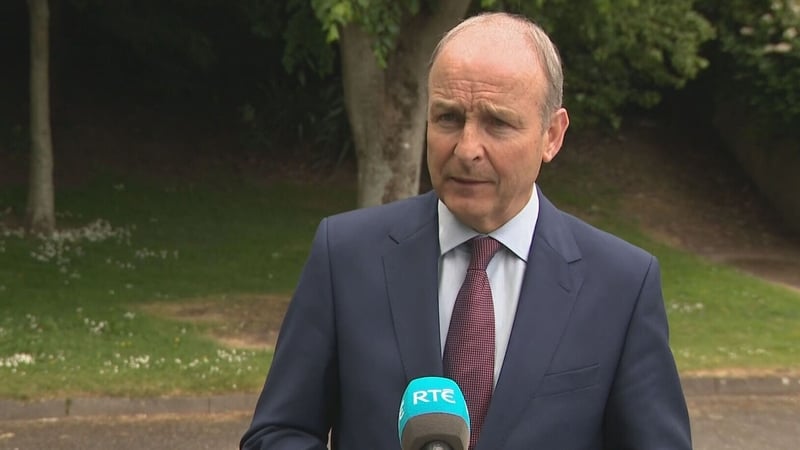The Taoiseach has said that it would be “very damaging” if US President Donald Trump acts on his threat to impose 50% tariffs on the EU from the start of June.
European stocks tumbled and the euro gave back some gains, while euro zone government bond yields fell sharply after Mr Trump’s announcement.
In a post on his Truth Social platform, Mr Trump said: “The European Union, which was formed for the primary purpose of taking advantage of the United States on TRADE, has been very difficult to deal with.
“Our discussions with them are going nowhere!”
The US President also threatened to impose a 25% tariff on Apple for any iPhones sold, but not manufactured, in the United States.
Speaking in Cork, Micheál Martin said the latest announcement by Mr Trump “is a surprise” as there was meant to be “a pause until early July”.
He said that “everybody in the EU is acting in good faith and wants a negotiated settlement with the United States”, stressing the trading relationship between the EU and US “is the most dynamic in the world”.
He said the reality is “tariffs of that height [50%] would be extremely destructive and would create even wider disruption across the global economy”.
“Tariffs are not good for economies, not good for people, for consumers, for workers, so a negotiated pathway is the only way forward,” he said.
“The European Union is prepared to act in good faith with the US to arrive in a negotiated solution here, and that will be the response and approach of the European Union at this particular juncture.”
The twin threats from Mr Trump roiled global markets after weeks of de-escalation had provided some reprieve.
The S&P 500 fell 0.9% in early trading, the Nasdaq fell 1.5%, and European shares fell 1.1%. Shares of Apple AAPL.O were down 2.5% in early New York trading.
The European Commission has sought clarity from the US, with Brussels’ and Washington’s trade chiefs due to talk later.
The commission said that it would not comment on the tariff threat until after a call between European Trade Commissioner Maroš Šefčovič and US Trade Representative Jamieson Greer.
“This is a major escalation of trade tensions,” said Holger Schmieding, chief economist at private bank Berenberg.
“With Trump, you never know. But this would be a major escalation. The EU would have to react and it is something that would really hurt the US and European economy.”
The EU already faces 25% US import tariffs on its steel, aluminium and cars and so-called “reciprocal” tariffs of 10% for almost all other goods, a levy that was due to rise to 20% after Mr Trump’s 90-day pause expires on 8 July.
Washington says that the tariffs are designed to redress the US deficit in goods trade with the European Union, which was almost €200 billion ($226.48bn) last year, according to EU statistics agency Eurostat.
However the United States does have a large trade surplus with the EU in services.
In the past week, Washington has sent Brussels a list of demands to reduce the deficit, including so-called non-tariff barriers such as by adopting US food safety standards and removing national digital services taxes, according to people familiar with the paper.
The EU response has been to offer a mutually beneficial deal that could include both sides moving to zero tariffs on industrial goods, the EU potentially buying more liquefied natural gas and soybeans and cooperating on issues such as steel overcapacity, which both sides blame on China.

The Šefčovič-Greer call was planned as a follow-up to these exchanges and ahead of a possible meeting in Paris in early June.
Polish deputy economy minister Michal Baranowski, whose country holds the rotating EU presidency, said the 50% tariff threat appeared to be a negotiating ploy.
“The European Union and the United States are negotiating. Some negotiate behind closed doors, others more in front of cameras,” he told reporters on the sidelines of a meeting in Brussels, adding negotiations could last until early July.
“The fact that we see some important statements in the public domain does not mean that they will translate into actions of the US administration,” he said.
The European Commission has repeatedly said it preferred a negotiated solution, but is ready to wield countermeasures if negotiations fail.
The bloc put in place, but then suspended, duties on €21bn of annual US imports in response to the US metals tariffs and has compiled a list of €95bn of US goods as countermeasures to the US ‘reciprocal’ and car tariffs.
Earlier, Tánaiste Simon Harris said Ireland and the EU must continue to focus on finding a “negotiated settlement” on the issue.
In a statement, the Minister for Foreign Affairs and Trade said the Government has repeatedly said that “we need a substantive, calm, measured and comprehensive dialogue” with the US on tariffs.
Mr Harris said the reality is tariffs are “bad for Ireland, the EU and the US” as they will inevitably “push up prices for consumers and businesses”, and called for a sensible response to the situation.
“A negotiated solution remains very clearly the goal and the preferred outcome,” the Tánaiste said.
Additional reporting Reuters



